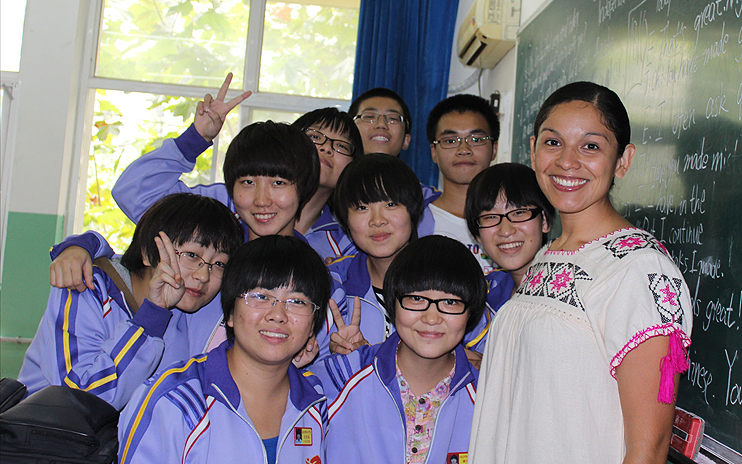Ellen Somerville
Nanjing Foreign Language School
2000-2001
Where to start? The beginning? Okay, my Chinese wonder year started with a notice on a bulletin board. A year in China, why not? Normally I like to have my ducks in a row, and plans A through infinity ready to implement. I had about three minutes before my first class started and in that time I called Margot and arranged for an interview.
Somehow all the wrangles with the NYC Board of Education, subletting my apartment and cat care got solved and before I knew it I was in Nanjing at the Foreign Language School. I laughed to myself at the first faculty meeting when I saw almost all the teachers sitting in the back of the auditorium reading newspapers, eating snacks, grading papers all through the meeting – just like home. Even the women who ran the copiers played Freecell or Solitaire – just like home.
But, of course, not much else was just like home. I had 55-60 kids in my middle school classes. I’ll never forget the little boy who used a telescope to see the front of the classroom or the kids taking off their glasses for eye exercises. Did the exercises cause poor vision or were the glasses simply a fashion statement?
The students and teachers were surprised to see me walking around the classroom instead of lecturing from a podium. They were also surprised that I couldn’t tolerate the constant chatter that was typical of most classrooms, but we all got used to each other soon enough.
Some of the women faculty members met with me weekly, ostensibly to improve their English. At first we talked about education and methods and finer points of English grammar, but in a short time we were just “girlfriends” talking about what girlfriends talk about.
I decided I would refuse no invitation that came my way, so I had lots of dinners at people’s homes. One I remember was about eight courses, ending with a Chinese style “hamburger”. I was a vegetarian in the US, but found it too difficult to maintain that diet in China, but I stayed away from meat as much as possible. Not wanting to offend my hosts who had gone to great lengths to provide what they thought I would really enjoy, I somehow got it down.
I went to a Christmas party at a kindergarten and sang Jingle Bells several dozen times, directed a sing-a-long at a senior center (I’m sure I was the oldest person there), had a part in a made for TV movie playing Dick Castle’s wife because Peggy looked too young for the part. That was as hard to swallow as the hamburger. Then there was the time I showed up at the western bakery for breakfast three days in a row with a different young man each time. On the third day, the Chinese waitresses gave me the raised eyebrow equivalent of a high-five. The young men were colleagues who missed their mommies.
I visited a school run by a Chinese friend’s brother-in-law and was treated like a rock star. I don’t think they had many western visitors. Many of the teachers told me that I was the first native English speaker they’d ever met. TV cameras followed me around all day and I was interviewed for the evening news. Three hundred students were chosen to have a Q&A with me and about two hundred young soldiers materialized and crowded into the auditorium. The first question was one I’d heard several times before: Does everyone in America have a gun? I don’t think they believed me when I said I’d never even touched a gun.
I was sure that there were some average students in Nanjing, ones who didn’t come up to the standard of brilliance of the students at the FLS, and I wanted to visit their school. My Chinese colleagues didn’t seem to understand why I would want to make such a visit, but one of them agreed to arrange it for me. I spent the morning talking with the English teachers and established a special bond with one of them. He had worked in a coal mine before he became a teacher. I told him my father also worked in a mine and then became a teacher, too. We spent a lot of time boring the other teachers with our comparisons of coal mining in China and the US, but we really understood each other. Several days after the visit a colleague asked me if I had a second teaching job (which I didn’t) because he’d seen posters on the fence outside that school with my picture on them advertising the “fact” that there was a native English speaker teaching there.
I could go on but I realize that I’ve not said much about my classroom experience, but honestly it wasn’t all that different from my teaching in the US. Middle school there was the same mixture of boys playing with matchbox cars and girls mature beyond their years. When I switched to high school the second term, the students’ English was fluent enough that they could read and discuss poems and short stories, give speeches and engage in Lincoln-Douglas debates.
I’ve kept in touch with several of the teachers I worked with and a few students. All in all, I had a great time!

